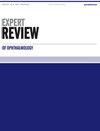Endoplasmic reticulum stress as an underlying factor in leading causes of blindness and potential therapeutic effects of 4-phenylbutyric acid: from bench to bedside
IF 0.9
Q4 OPHTHALMOLOGY
引用次数: 0
Abstract
ABSTRACT Introduction Mounting evidence has emerged showing that endoplasmic reticulum (ER) stress participates in triggering cell injuries in ocular tissues, manifested as disorders such as cataracts, age-related macular degeneration, glaucoma, and diabetic retinopathy. Areas covered ER stress is a condition in which the ER is perturbed by the accumulation of unfolded and misfolded proteins. In a dynamic signaling cascade, the unfolded protein response (UPR) is triggered by three ER-transmembrane stress sensors to restore homeostasis and cell survival, however, if it fails, the cell will undergo a sustained ER stress condition which deteriorates cell function and promote cell death. Sustained ER stress is shown to contribute in a wide range of diseases including ophthalmologic disorders. Targeting ER stress by inhibitor agents might have promising therapeutic implications in treating eye disorders. The current review summarizes the results of the latest studies in support of the potential therapeutic utility of 4-phenylbutyric acid (4-PBA), an FDA approved ER stress inhibitor, in disorders leading to permanent vision loss. Expert opinion The therapeutic potential of 4-PBA in ophthalmic diseases is strongly supported by many experimental studies. Safety and efficacy studies of intravitreal injection of 4-PBA and other ER stress by inhibitors, are lacking.内质网应激是导致失明的潜在因素,4-苯基丁酸的潜在治疗效果:从试验台到床边
越来越多的证据表明内质网应激参与触发眼部组织细胞损伤,表现为白内障、年龄相关性黄斑变性、青光眼和糖尿病视网膜病变等疾病。区域覆盖内质网应激是内质网受到未折叠和错误折叠蛋白质积累的干扰的一种情况。在一个动态信号级联中,未折叠蛋白反应(UPR)由三个内质网跨膜应激传感器触发,以恢复体内平衡和细胞存活,然而,如果它失败,细胞将经历持续的内质网应激状态,从而恶化细胞功能并促进细胞死亡。持续内质网应激被证明在包括眼科疾病在内的广泛疾病中起作用。利用内质网应激抑制剂治疗眼病可能具有很好的治疗意义。本综述总结了支持4-苯基丁酸(4-PBA)潜在治疗效用的最新研究结果,4-苯基丁酸是FDA批准的内质网应激抑制剂,用于治疗导致永久性视力丧失的疾病。许多实验研究有力地支持了4-PBA在眼科疾病中的治疗潜力。目前缺乏玻璃体内注射4-PBA和其他内质网应激抑制剂的安全性和有效性研究。
本文章由计算机程序翻译,如有差异,请以英文原文为准。
求助全文
约1分钟内获得全文
求助全文
来源期刊

Expert Review of Ophthalmology
Health Professions-Optometry
CiteScore
1.40
自引率
0.00%
发文量
39
期刊介绍:
The worldwide problem of visual impairment is set to increase, as we are seeing increased longevity in developed countries. This will produce a crisis in vision care unless concerted action is taken. The substantial value that ophthalmic interventions confer to patients with eye diseases has led to intense research efforts in this area in recent years, with corresponding improvements in treatment, ophthalmic instrumentation and surgical techniques. As a result, the future for ophthalmology holds great promise as further exciting and innovative developments unfold.
 求助内容:
求助内容: 应助结果提醒方式:
应助结果提醒方式:


